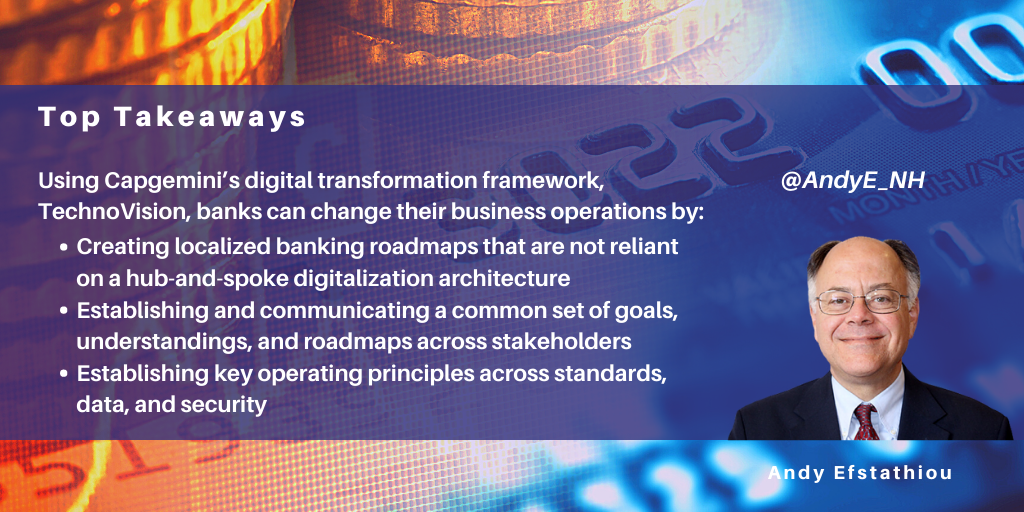Search posts by keywords:
Filter posts by author:
Related NEAT Reports
Other blog posts
posted on May 18, 2021 by Andy Efstathiou

The pandemic has accelerated the adoption of digital transformation across all industries, and in the financial sector, operational transformation has grabbed the top spot in the priority list for investment and spending. At the same time, performance dispersion (the variance across institutions within the industry) has significantly increased.
So, how can banks make their transformation initiatives effective, and what drives performance? Multiple firms, banks, and IT/operations services vendors, are now creating digital transformation frameworks to help improve the effectiveness of these efforts.
Capgemini’s TechnoVision framework
Capgemini has created its own transformation framework, TechnoVision, which identifies key business/technology levers, evaluates technologies, enables initiative prioritization, and supports disciplined creation and execution of a transformation strategy.
Strategic considerations are based on three core principles, backed by technology domains, which are:
- Standards: each technology, and the domain it is applied in, requires customized standards which are set by the ecosystem it operates in
- Data: sourcing, scrubbing, analyzing, and using data in businesses
- Security: security practices relevant to the specific operational environment.
Technology domains under consideration are Cloud, AI, Immersive, Connected, High Performance & Decentralized Technologies. The operational framework is adapted to each industry where it is employed. TechnoVision has the following key components:
- Infrastructure areas for transformation:
- Invisible infostructure: coordination of the technology infrastructure
- Applications unleashed: the application and API domain
- Thriving on data: the data and AI domain
- Process on the fly: the process automation domain
- People-focused areas:
- You experience: stakeholder experience domain
- We collaborate: workforce and partner coordination
- The design principles for transforming delivery technology. Here, the principle of balance by design aims to balance and coordinate people and systems to create sustainable delivery.
The framework allows banks to move from a centrally controlled organization (hub and spoke model) to a decentralized model, coordinated by a set of operational/business standards and a single golden-source set of data. The value of the framework is that it can deliver:
- Growth: driven by hyper scaling in two directions: matching costs/revenues, and the ability to harvest smaller economic opportunities more efficiently
- Efficiency: driven by lower error rates, reduced reconciliation/fixes, improved STP/fulfillment, and lower cost
- Stakeholder engagement: driven by higher CSAT, improved CX, higher up/cross-sell
- Resiliency (losses previously to generational change, silos, and latency responses to societal changes)
Conclusions
Financial institutions of a wide variety of backgrounds and characteristics are looking to undertake digital transformation with third-party services and technology vendors. There needs to be a meeting of the minds among all stakeholders to ensure the transformation process is effective. A transformation framework helps to establish and communicate a common set of goals, understandings, and roadmaps across stakeholders.
Capgemini’s TechnoVision framework for financial services helps banks address transformation issues across the enterprise, including standards, data, and security. The framework has been used in many global and regional banks to define and accelerate the transformation journey. Other services vendors have similar frameworks, though TechnoVision is distinctive in its use of sessions with local banking executives to create localized banking roadmaps which are not reliant on a hub and spoke digitalization architecture. We expect to see Capgemini build more real-time transaction capabilities with its clients to address banking’s move away from wide settlement windows and batch processing.
